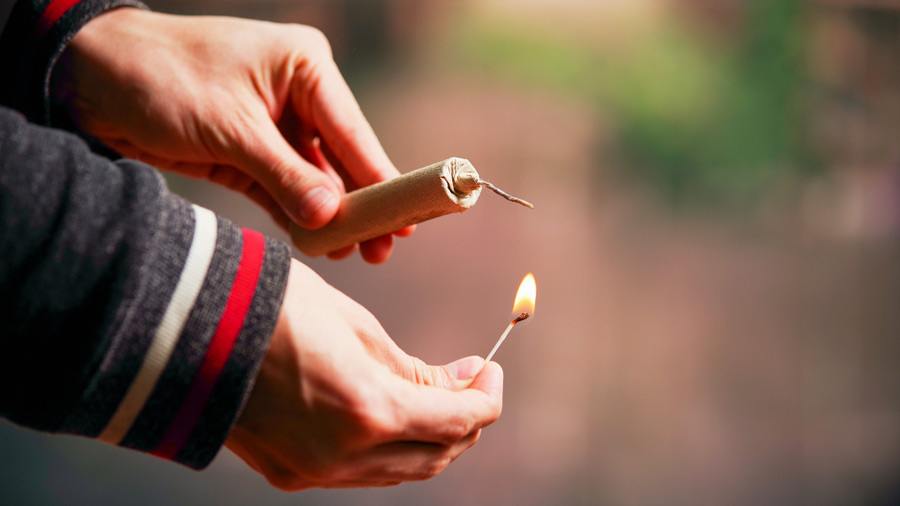The decibel demons are all ready to take on the daakinis and joginis this Kali Puja and Diwali with a recent suo motu directive from the West Bengal Pollution Control Board relaxing the three-decade-old 90-decibel noise limit for crackers to 125 decibel.
A division bench of Calcutta high court, acting on a public interest litigation opposing the change of maximum noise limit of firecrackers, has asked the green watchdog to explain the reasons within three weeks.
The Plurals spoke to several experts to trace the origin of the noise limit for firecrackers in West Bengal — 90 decibel at 5 metres from the point of blasting — and how it remained unchanged despite the national noise limit remaining at 125 decibel.
The state limit
When Calcutta High Court first imposed a restriction on noise level in the Nineties, it had asked the then West Bengal Pollution Control Board what the noise limit should be. In 1997, while the loudspeaker noise level was fixed at 65 decibel in tune with the level fixed for commercial areas during daytime as the city has a mixed demography, the noise limit for firecrackers was fixed at 90 decibel being measured from 5 metres — based on a report of a national committee set up by Central Pollution Control Board earlier.
The national limit
The noise limit for fireworks nationwide is 125 decibel from 4 metres. According to experts, if the same is measured from 5 metres, the value would be around 123 decibel — still much higher than the Bengal limit. An expert committee set up by the Central Pollution Control Board in late 90s had recommended 125 decibel as the national limit but also proposed that the limit should be reduced from 2000 starting with 5 decibel. But no change has been made in the last 23 years despite the noise restrictions getting stringent internationally during the period.
Is it legal for a state to have a stronger limit than the country
The obvious discrepancy between the state and national limit has been a bone of contention since the beginning and fireworks traders have repeatedly moved court, citing the “ambiguity’, but with little success. The Environment Protection Rules of the country empowers any state board to tighten environmental standards based on its local requirement. There are several examples of it nationally, including in Bengal. The Union ministry of environment and forest has also confirmed that the Bengal limit is in keeping with the legal provision.
Why Bengal needs a stringent limit
West Bengal is one of the most densely populated regions globally and hence any noise is likely to have a very high impact on the exposed population. According to the latest census, 12 of the 50 most densely populated cities in the world are in Bengal while greater Kolkata has five of the eight most populated places worldwide. Being an unplanned city, any noise generated in Kolkata ends up impacting a larger section of the community. The World Health Organisation guidelines for night noise recommend less than 40 dB(A) of annual average outside bedrooms to prevent adverse health effects. A state pollution control board committee led by ENT physician Dulal Bose, set up by PCB a few years ago, clearly stated that the limit should not exceed 90 dB on health grounds. The PCB had reiterated the standard in 2017 based on that report. High noise also affects animals as vindicated by the death of a horse around the time fireworks were being burst at the Eden Gardens to celebrate India’s victory over South Africa in a World Cup match.
Change of state’s firework noise limit
The PCB has said that the noise limit had to be changed, in keeping with the advocate general’s advice, according to the Supreme Court’s 2018 direction in the Arjun Gopal case. Experts point out the said verdict was focussed on reducing air pollution from fireworks as the court had advised the use of green fireworks only as that would cut down emission by around 30 per cent while continuing with the existing noise limit. Hence, according to experts, the PCB had no legal obligation to change the noise limit. Environmentalists allege that the change was the result of lobbying by some firework traders while the PCB maintains that a legal push from the state government was the trigger. A former PCB official clarified that the agency, set up under the National Water Pollution Act, has no legal obligation to follow the advocate general’s advice.
What the noise limit change can trigger
Both noise and air pollution are pegged to break all records in Kolkata on Diwali night. Environmentalists claim that the suo motu change of noise limit, apart from allowing high-decibel firecrackers back into the market officially, hint that the government is not serious about combating noise and air pollution in a city that is only second to Delhi among metros in term of noise pollution and pretty high up on the noise pollution scale as well. Regulatory agencies are busy pointing fingers at each other; while the PCB says the onus is on police and the cops plead lack of technical capacity. Union government agencies like the Petroleum and Explosives Safety Organization (PESO) or National Environmental Engineering Research Institute (NEERI), who have been mandated by the apex court to look into the green fireworks, also cited limited manpower.
